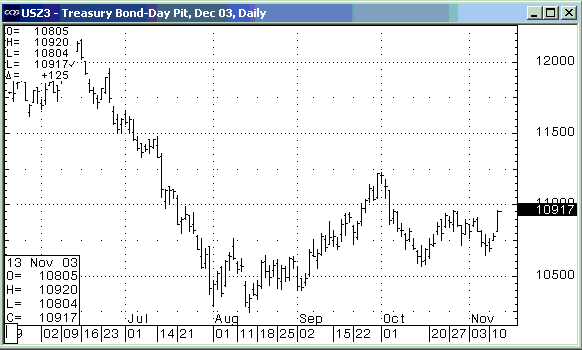A few weeks ago I fretted about the apparent contradictions of Bush’s economic policy. I thought that
Either there’s going to be continued economic recovery and bonds are going to get killed, or there’s going to be a weaker recovery combined with inflation and a weak dollar and bonds are going to get killed.
Now I’m not sure. Stocks haven’t been able to rally in the short run, the dollar is weaker, and the bond market is bubbling and simmering.

Note also (e.g., here and here) that growth rates in monetary aggregates slowed significantly during recent months. It’s conceivable that the markets have already discounted expected inflation. Rates may yet go up as the economy continues to recover, but in the short run, at least, inflation fears may not be as potent as they were a few months ago.
There’s a bunch of economic statistics due to be released Friday. Recent number releases have tended to be upside surprises that were positive for stocks and negative for bonds. The same thing could happen tomorrow. However, the markets seem to have begun to discount optimism. If tomorrow’s data come out below expectations we could get a big break in stocks and a pop in the bond market. That would be the path of least resistance.
Maybe in the long run bonds really will get killed, but that forecast seems premature for now. Too many people expect it, just as too many of us are waiting for a stock rally. Market reaction to the coming data releases should help to clarify whether the bond market’s recent strength will continue or has run its course.
No, no, no, the NYT insists that Greenspan raise rates to stop inflation. The specter is rising, something must be done now, or the dems will lose the presidency.
Bond markets try to anticipate policy as much as economics. So if they believe that the Fed will keep rates low until after the Election, there is value along the curve. Calling for higher rates and inflation is of course part of the Democrat game plan. As to inflation, anywhere that prices are set by demand and supply, they are falling. Cap -u is low, pricing power is with profits rather than labour and goods prices – esp imports are falling as the benefits of Chinese productivity go to US consumers. Anywhere they are set by government they are rising. Tariffs on Chinese imports as some politically wise but economically dumb politicians are proposing would most likely push up the only prices currently falling.